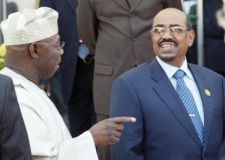AU summit hopes to persuade Sudan to accept UN force
June 29, 2006 (ADDIS ABABA) — African Union leaders meeting at a weekend summit will be in search of fresh solutions to overcome Sudan’s resistance to a UN takeover of their impotent peacekeeping mission in the troubled Darfur region.

|
|
The former Chairman of the AU, Nigeria’s Olusegun Obasanjo with President of Sudan Omar Al-Bashir, after the opening of the AU 6th Summit in Khartoum, Monday, Jan. 23, 2006. (AP) . |
Although the AU has agreed to hand over its 7,000-strong force to the United Nations due to financial shortfalls, Khartoum has steadfastly opposed the move, insisting that it reeks of neocolonialism and would worsen conflict.
Sudan’s President Omar al-Beshir said Sunday his forces could take over if the AU abandoned or relinquished its current mandate, thereby casting a dark shadow on international efforts to pacify Darfur, a region the size of France undergoing one of the world’s worst humanitarian crises.
Beshir’s stiffening opposition came amid high tensions with the UN, which Khartoum accused of breaching its mandate by transporting a rebel leader out of Darfur.
Although a ban on UN operations in Darfur has been lifted, the Sudanese government made it clear that it was keenly watching.
Diplomats agree that the Darfur standoff is set to strain the July 1-2 summit in the Gambian capital Banjul, but were unsure an accord would be found.
“The question of Darfur will be very difficult to push forward in the summit,” said one AU official who asked to remain unnamed.
The AU has insisted however that it will hold to its plan to withdraw from Darfur.
“Our position has not changed: the AU made a decision on the transfer, the UN also made a decision,” said another diplomat.
“The AU has no means of maintaining the mission and there is need now to find a formula because the UN cannot go to Darfur without Sudan’s consent,” added the diplomat, highlighting the delicate balance the summit has to make.
With AU presidents and ranking officials determined to resolve the dispute at an African level, analysts predict intense diplomatic jostling in Banjul as participants launch no-holds-barred diplomacy to sway Sudan into accepting the UN takeover.
One lure which could be used is a pledge that Sudan will be given the next presidency of the bloc’s rotating leadership.
“The leaders will have to use all arguments to convince Sudan to accept the transfer, inclusing assuring Sudan that it will hold AU’s next presidency in 2007, because the AU cannot continue by itself in Darfur,” said one African observer at AU headquarters in Addis Ababa.
Earlier this year, Sudan launched a bid to chair the AU, triggering noise protest from human rights groups that it would be tantamount to rewarding Beshir for alleged war crimes and human rights violations.
African observers said the president feared a UN presence on the ground in Darfur could make Khartoum officials and their allies vulnerable to international justice.
“Beshir fears that once the United Nations moves to Darfur, it will be difficult to stop the prosecution of some people before international tribunals,” said another diplomat.
Recent developments have are also likely to complicate the scenario.
The hauling of former Liberian strongman Charles Taylor before an international war crimes court has not warmed the Sudanese to UN peacekeeping efforts. Now similar calls are being made for Chadian ex-dictator Hissene Habre, currently held in Senegal over alleged atrocities, to be extradited to face justice abroad.
“Some heads of state think that with what happened to Taylor, there is need to be cautious,” according to a Western diplomat based in Ethiopia.
Nonetheless, the United States and the UN have relentlessely called for a rapid deployment of the UN peacekeepers to halt human suffering and help end the Darfur conflict that has now spilled into the neighbouring Chad.
As least 300,000 people have been estimated killed and more than two million displaced in three years of conflict in Darfur.
In 2003 decades of tribal fighting erupted into all-out violence when indigenous rebels from the region took up arms, accusing the Arab government in Khartoum of neglect and calling for autonomy.
In addition to Darfur, a simmering conflict in Sudan’s east and strains in implementing the country’s historic north-south peace agreement have soured ties between Khartoum and the West in recent months.
(ST)
